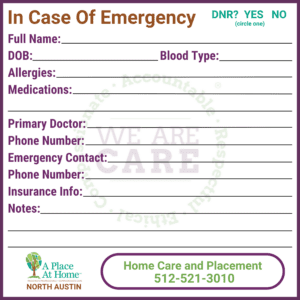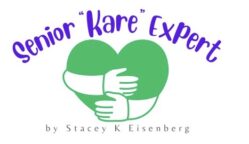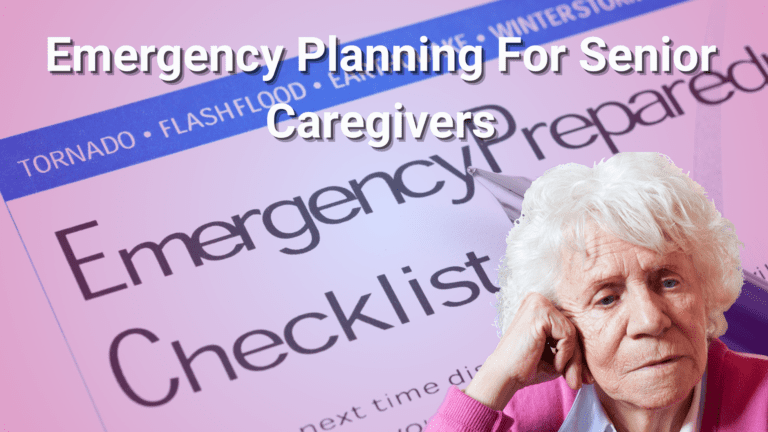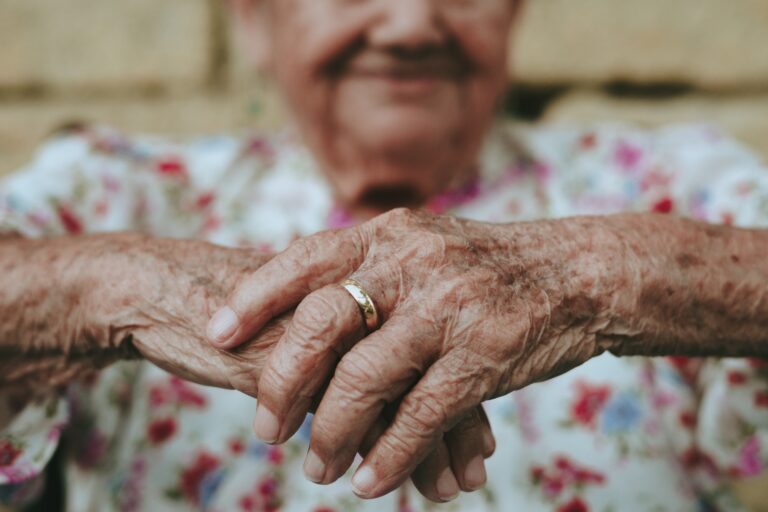Have you ever found yourself in the middle of a storm, the streets flooding, power going out around the city and having no idea what you should do next? Many seniors in Houston faced this reality during Hurricane Beryl, the first storm of the season. As the storm struck the city, many seniors found themselves struggling without a plan, being horribly impacted by the heat or in facilities that weren’t required to have backup generators to deal with the intense heat and power outages.
As millions were left without power, 14 nursing homes and 30 assisted living facilities in Harris County were without power four days after Beryl struck Texas. When a storm hits Texas, utilities, by law, are supposed to give nursing homes and assisted living centers (as well as hospice sites) the same “priority” as hospitals when it comes to restoring power. How that happens and how fast is not detailed by the state. Sadly, there is no requirement that the state’s nearly 2,000 assisted living facilities and 1,200 nursing facilities have generators to power heating and cooling systems. The only requirement is that they have alternative power sources to keep medication refrigerated and lifesaving equipment, like oxygen machines, up and running. Even electronic locks, medical alert systems and pendants ceased functioning,
Mrs. Thompson, 78, lives alone and uses a cane to get around. When Beryl hit, her power went out, leaving her without air conditioning in the sweltering heat. Fortunately, Mrs. Thompson had an emergency plan. She had a well-stocked emergency kit, a list of important contacts on her refrigerator, and neighbors who checked on her regularly. Thanks to these preparations, she managed to stay safe and comfortable until help arrived. Many of her neighbors who count on their caregivers, struggled when their caregivers could not make it because of the issues they faced on the roads and with their own families.
My own family was in Houston during the storm. I was glad they were staying in a safe place, but this highlights the importance of having an emergency plan, especially for our most vulnerable seniors. During emergencies, whether it’s a hurricane, power outage, crazy ice storm or other disaster, having a solid plan in place for your seniors can make all the difference. It can ensure that seniors have the resources and support they need to weather the emergency safely.
Let’s use the lessons learned from Hurricane Beryl to prepare for the next emergency. By taking proactive steps now, we can protect our loved ones, and ourselves, ensuring that everyone is ready to face whatever challenges come our way. Have you checked their emergency kit recently?
Recognizing Risks and Vulnerabilities for Your Seniors
As we plan, we need to identify the specific vulnerabilities that your seniors face during emergencies. Understanding these risks will help us create a comprehensive emergency plan that addresses the unique needs of our loved ones. Here are some key areas to consider if they lose power, air conditioning or heat, water, or even their home:
Power Outages
Here in Texas we get our fair share of outages. I remember several blackouts growing up in New York, and this week I have friends in Canada who are experiencing power outages.
Health Risks:
- Medical Equipment: Many seniors rely on medical devices like oxygen concentrators, CPAP machines, or mobility scooters that require power. When the power goes out, these essential devices stop working and charges wear out, posing significant health risks. Have you checked if your medical devices have backup power? How long will it last?
- Refrigeration of Medications: Certain medications, such as insulin, need refrigeration. A prolonged power outage compromises their effectiveness, endangering health. Make sure you have a plan to keep these medications cool. Do they have a good cooler, like a Yeti, they can fill with ice as the storm hits to keep items cool?
- Temperature Regulation: Seniors become more vulnerable to extreme temperatures based on their medical conditions, and their medications. Without air conditioning, they risk dehydration, heat exhaustion or heat stroke in hot weather. In cold weather, lack of heating can lead to hypothermia. It is helpful to always have some electrolyte packets available with some bottled water.
Daily Living Challenges:
- Lighting: Navigating in the dark increases the risk of falls and injuries, especially for seniors with limited mobility or vision problems. Keeping flashlights handy can make a big difference. I also like to recommend having some battery powered LED lights and nightlights around as backup.
- Communication: Landline phones might not work, and if cell phones run out of battery, it becomes difficult to call for help or stay informed about the situation. Have you thought about how you’ll stay in touch during a power outage?
Air Conditioning or Heating Loss
What if their HVAC units go out of service in their private home or in their senior housing?
Health Concerns:
- Heat-Related Illnesses: Without air conditioning in the Texas heat, seniors can overheat, become dehydrated, fight with heat exhaustion, or heat stroke. Are you prepared for them to stay cool without AC? Do you have someone you can call to service their unit in an emergency?
- Cold-Related Illnesses: In colder climates, lack of heating can result in hypothermia, frostbite, and exacerbation of chronic conditions like arthritis and respiratory illnesses. Some seniors can struggle putting on multiple layers of clothing.
Comfort and Well-being:
- Sleep Disruptions: Extreme temperatures disrupt sleep patterns, affecting overall health and well-being.
- Increased Stress: The discomfort of being too hot or too cold increases stress and anxiety levels, particularly for those with pre-existing mental health conditions.
Water Supply Interruption
Hydration and Hygiene:
- Dehydration Risk: Are we noticing that seniors are particularly susceptible to dehydration, which leads to severe health issues such as urinary and kidney problems, heat injury, and electrolyte imbalances. Do you have enough bottled water on hand?
- Hygiene Challenges: Lack of water makes it difficult to maintain personal hygiene, increasing the risk of infections and skin conditions. Do you have a supply of full body shower wipes and hand sanitizer?
Food Safety and Nutrition:
- Meal Preparation: Without water, preparing meals and maintaining a nutritious diet becomes challenging. Seniors might resort to eating less healthy, non-perishable foods.
- Sanitation: Washing hands and cleaning food becomes difficult, increasing the risk of foodborne illnesses. Have you stored enough water for both drinking and cooking?
Loss of Home
Immediate Safety and Shelter:
- Temporary Housing: Finding immediate shelter becomes critical. Seniors often need assistance accessing emergency shelters or temporary housing. Do you know where they would go if they had to evacuate? Who would you call for help?
- Safety Concerns: The chaos of losing one’s home leads to confusion, disorientation, and increased vulnerability to falls and injuries.
Emotional and Psychological Impact:
- Stress and Anxiety: The trauma of losing a home heightens stress, anxiety, and even depression. This is especially true for seniors who have strong emotional attachments to their homes.
- Cognitive Decline: For seniors with conditions like dementia, the loss of familiar surroundings exacerbates confusion and disorientation.
Practical Considerations:
- Access to Essentials: Important items like medications, medical records, and personal identification might be left behind or lost, complicating recovery and care. Do you have backups of their most important documents and records?
- Continuity of Care: Displacement disrupts routine medical care and access to regular healthcare providers.
Recognizing these vulnerabilities and planning for them ensures the safety and well-being of our seniors during emergencies. Proactive measures like having an emergency kit, setting up ICE contacts, and maintaining a list of medications and health conditions significantly mitigate these risks. Have you checked your emergency supplies and updated your contact lists recently?
Essential Components of an Emergency Plan
-
Contact Information
In Case of Emergency (ICE) Phone Contacts
- Have ICE Contacts on Cell Phones: ICE contacts provide critical information to first responders during emergencies. According to the Journal of Emergency Medical Services, having ICE contacts can significantly improve response times and the quality of care. Imagine how much quicker help can arrive if responders immediately know who to call!
- Steps to Set Up ICE Contacts on Different Types of Phones:
- iPhone: Open the Health app, tap on your profile picture, and go to “Medical ID.” Add your ICE contacts and other medical information.
- Android: Go to Contacts, select a contact, and choose the “Set as ICE Contact” option. You can also use third-party apps designed for ICE information.
In Case of Emergency Refrigerator Magnet
 Use of “In Case of Emergency” Refrigerator Magnets: Emergency responders often check the refrigerator for vital information. The National Association of Emergency Medical Technicians recommends this practice, as it provides quick access to essential details. Have you placed an ICE magnet on your fridge yet?
Use of “In Case of Emergency” Refrigerator Magnets: Emergency responders often check the refrigerator for vital information. The National Association of Emergency Medical Technicians recommends this practice, as it provides quick access to essential details. Have you placed an ICE magnet on your fridge yet?- What Information Should Be Included:
- Contacts: List primary and secondary emergency contacts with phone numbers.
- Medical Conditions: Include any chronic illnesses or conditions.
- Medications: Provide a list of all medications, including dosages and schedules.
- Allergies: Note any allergies, especially to medications.
- Do Not Resuscitate instructions.
-
Medical Information
Comprehensive List of Medications
- Keep an Updated List of Medications, Dosages, and Schedules: Nearly 40% of adults aged 65 and older take five or more medications. Keeping an updated list helps prevent medication errors during emergencies. Is your medication list up to date?
- Include Over-the-Counter Drugs and Any Supplements: Many seniors use over-the-counter medications and supplements, which can interact with prescription medications. Including these on the list ensures comprehensive medical care.
Medical History
- Document Chronic Conditions, Recent Surgeries, Allergies, and Other Relevant Health Details: Detailed medical histories help healthcare providers make informed decisions during emergencies. The American Medical Association emphasizes the importance of having a readily accessible medical history. Do you have your medical history documented?
-
Supplies and Equipment
Emergency Kit Essentials
- Basics: FEMA recommends having at least a three-day supply of water (one gallon per person per day), non-perishable food, a flashlight, batteries, a first aid kit, blankets, and clothing in your emergency kit. Have you checked your emergency kit lately?
- Special Needs: Include prescription medications, medical devices (e.g., hearing aids, glasses), and mobility aids. According to the American Red Cross, these items are crucial for maintaining health and mobility during emergencies.
Medical Equipment
- Ensure Extra Batteries for Medical Devices: Make sure to have extra batteries for essential medical devices like hearing aids and mobility scooters. Keeping a backup supply of batteries avoids interruptions in the use of these devices. Do you have extra batteries ready?
-
Home Safety Modifications
Fall Prevention
- Falls are the leading cause of injury among older adults. Have you made modifications to reduce fall risk and enhance safety for your senior?
Fire Safety
- Smoke Detectors, Fire Extinguishers, and a Clear Evacuation Route: The National Fire Protection Association advises installing smoke detectors on every level of the home, keeping fire extinguishers accessible, and planning and practicing an evacuation route to ensure safety during a fire. Do you have a clear fire evacuation plan they can follow?
Incorporating these essential components into an emergency plan ensures the safety and well-being of seniors during emergencies. Regularly reviewing and updating the plan is crucial to maintaining preparedness. Have you checked your emergency supplies and updated your contact lists recently?
Emergency Communication and Coordination For Seniors
Family and Caregiver Communication
Regular Check-ins
- Regular check-ins ensure seniors stay safe and have the supplies needed ahead of an emergency. Schedule daily calls or visits, especially during extreme weather or other emergencies. Use technology like video calls or apps for quick communication.
Emergency Contacts and Plans
- Make sure everyone involved in the senior’s care understands the emergency plan and their responsibilities. Hold a family meeting to go over the plan and give copies to everyone. Create a phone tree to ensure quick information sharing during an emergency. Knowing roles and tasks reduces confusion and ensures swift action when needed.
Emergency Planning Community Resources
Local Support Networks
- Register seniors with local emergency services, community centers, and senior support organizations for additional assistance during emergencies.
- Contact your local fire department, police station, or emergency management office to register seniors. This ensures first responders are aware of their needs and can check on them during emergencies.
- Community centers often offer shelter, meals, and other resources during emergencies. Organizations like Meals on Wheels may provide extra support, ensuring seniors receive necessary services even when regular schedules are disrupted.
- Senior Support Organizations: Senior support organizations can provide additional aid, such as transportation and medical supplies. For example, the CDC’s STEADI initiative focuses on fall prevention and can offer resources and support.
- Make sure to check out the emergency planning resources on the Ready.Gov website.
Veteran Services
- Veterans can access specific programs designed to help during emergencies. The VA provides emergency support and healthcare services, including housing assistance, medical care, and mental health services.
- Programs like the VA’s Homemaker and Home Health Aide Care offer in-home support critical during emergencies. Veterans should contact their local VA office to learn more about available resources and have these benefits already in place before an emergency occurs.
- The VA provides respite care and medical support tailored to veterans’ needs, ensuring they receive appropriate care and support during emergencies. Prior to an emergency it may make sense to look into a community for respite services so that you know they are taken care of by staff and you can worry about dealing with the upcoming emergency.
Mr. Lewis is a 76-year-old veteran living alone. His family has set up a daily check-in routine with him after noticing he was becoming forgetful. During a recent heatwave, the power went out in his neighborhood. Because his family and caregivers knew the emergency plan, they quickly coordinated to ensure he had a cool place to stay.
Establish these communication and coordination strategies to keep your loved ones safe and supported during any emergency. Have you discussed your emergency plan with your family and caregivers?
Getting Your Senior’s Emergency Plan in Order
Creating a comprehensive emergency plan for our vulnerable seniors isn’t just a precaution—it’s a necessity. From ensuring they have ICE contacts on their phones to stocking an emergency kit with essential supplies, every detail counts. Establishing regular communication routines and leveraging community resources can significantly enhance their safety and well-being.
Remember Mr. Lewis, the veteran who found himself without power during a heatwave? His story is a powerful reminder that preparation can make all the difference. Our emergency plans must be thorough and carefully crafted, considering every possible scenario.
As you review and update your emergency plans, think about how you can incorporate these strategies to protect your loved ones. Engage in conversations with senior care coordinators, family and caregivers, register with local services, and ensure everyone knows their role. These steps will provide peace of mind, knowing that your senior is prepared for any challenge.
Have you reviewed your emergency plan lately? Now is the perfect time to ensure it’s up to date and comprehensive. By taking these proactive steps, you’re not just preparing for an emergency—you’re safeguarding the future for your senior loved one.

From a young age, Stacey’s link to the senior care industry grew alongside her mother’s work at a nursing home, where she often accompanied her. By her early teens, she secured her first official job at a nursing home, laying the foundation for a profound journey in senior care spanning over four decades. Her roles varied from opening assisted living and memory care residences to working in nursing homes and independent senior living communities. As the former Director of Fun for 300 independent seniors, she expertly organized daily events and trips. Stacey’s unwavering passion, nurtured by her family, and professional dedication as a recreation therapist, reflect her deep commitment to preserving the dignity and well-being of seniors.
Stacey’s senior care expertise has been recognized by the media including U.S. News and World Report and Care.com.
Stacey and her husband Bryan are the owners of the senior in-home care agency A Place At Home – North Austin.




